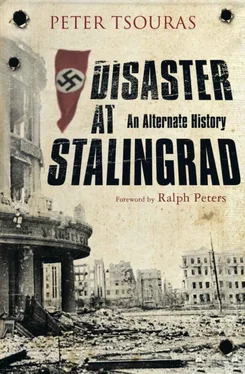He had done so well that Stalin had sent him to China as part of the military mission to advise Chiang Kai-shek and personally briefed him as a mark of his favour. That favour was prized as much as his disfavour was deadly. Four years before Stalin had slaughtered his senior officer corps in fear of a coup led by the brilliant Marshal of the Soviet Union Mikhail Tukhachevsky, the creator of Soviet mechanization in warfare and the concept of deep battle. Luckily for Chuikov, he had not been a part of the great man’s clique and survived when all around him were being shot or sent to the camps.
Troop train of the 6th Panzer Division, 25 April 1942
The men slept in the lullaby rocking of the train as it sped across the Ukraine, Poland, the Reich, and then into France. La Belle France. From the frozen hell of Russia the men would detrain into a dream world of a French spring. From frozen ground to soft beds, from frozen rations to warm bread, from Russians who were trying to kill them all the time, to French women who were willing to please a man, almost all the time. The 6th Panzer Division had been sent to France to re-equip and rebuild as a reward for its fine fighting record, an investment in future glory.
Hardly a man would argue that the division’s survival and success was due to its commander, General Erhard Raus. Not only had he beaten the Russians at every turn, but he had repeatedly rescued his men who had been cut off by the enemy. They had affectionately coined the slogan, ‘Raus zieht heraus!’ (‘Raus gets you out!’). Raus was an Austrian with a talent for armoured warfare that some men had compared to that of Rommel. Both had gone through the hard school of the Gebirgsjäger, or mountain troops, in the First World War and won their laurels. Both were also exacting trainers of men and had inculcated the Gebirgsjäger creed of aggressive initiative and high training to their men. The test had been battle. For Rommel it had been the sand of Africa. For Raus it had been the snow of Russia.
Raus could not afford to sleep. Already in his mind’s eye, he was seeing the transformation of his worn-out division into a resharpened sword. A thousand and one things needed to be done. The absorption of thousands of replacements, reception of hundreds of new fighting vehicles and heavy weapons, then training, training, training, and again training. He had made them lethal, and now they were to rest, rebuild. Already he was planning on making them even more lethal.
Borisov, Headquarters, Army Group Centre, 25 April 1942
The commander of Army Group Centre, Field Marshal Günther von Kluge, counted himself lucky to have an operations officer with the brilliance of Colonel Henning von Tresckow. He had been one of the main architects, along with General Erich von Manstein, of the plan for the attack through the Ardennes in the 1940 campaign in the West that had destroyed France.
Tresckow was from an ancient Prussian military family and in June 1918 he had become the youngest lieutenant in the Imperial German Army at the age of seventeen. In the last few months of that war he won the Iron Cross First Class for his outstanding physical feats and the moral courage to take independent action. His superior at the time remarked, “You, Tresckow, will either become chief of the General Staff or die on the scaffold as a rebel.’ 14
What few knew in 1942 was that Tresckow was a determined member of the plot to remove Hitler. A committed Lutheran Christian himself, he once said, ‘I cannot understand how people can still call themselves Christians and not be furious adversaries of Hitler’s regime.’ 15As early as 1938 he had said, ‘Both duty and honour demand from us that we should do our best to bring about the downfall of Hitler and National Socialism in order to save Germany and Europe from barbarism.’ In the 1941 campaign in Russia he had been sickened and appalled by the treatment of Russian POWs, the infamous Commissar Order, and the murder of Jewish men, women and children by the Einsatzgruppen as well as personal observation of the massacre of Jews at Borisov. His appeal to the then army group commander to take direct action had fallen on deaf ears.
Almost single-handedly he began to organize a plot to kill Hitler. He had made contact with like-minded men in Berlin and elsewhere, some of whom had already tried to kill Hitler, but the man had the devil’s own luck. At the same time he recruited into key positions in Army Group Centre a number of sympathetic officers.
He was immediately impressed with a visitor from Oberkommando des Heeres (OKH, Army High Command), the young Major Claus Graf von Stauffenberg who had already made a name for himself as the star of the General Staff. Born to an aristocratic Catholic family from southern Germany, Stauffenberg was descended from one of Germany’s greatest heroes, Field Marshal August Graf von Gneisenau, the soldier who had defied Napoleon’s legions at the moment of Prussia’s overthrow in 1806 and who in 1815 had rallied the beaten Prussian Army to fall on the French Emperor’s flank at Waterloo. The young Stauffenberg had grown up in a spirit of pious Catholicism, aristocratic traditions of service to the state, a classical education, and the aura of romantic poetry. One biographer described the 37-year-old count:
Stauffenberg’s reputation as a brilliant General Staff officer continued to grow. Everyone wanted to know him, even older officers, generals reporting from the front, and the Chief of the General Staff himself sought his advice. His habit of interrupting an evening’s work to recite a poem by Stefan George contributed to his aura of distinctiveness and intellectuality.
It was at this meeting that Tresckow concluded that his visitor was a ‘non-Nazi, and indeed saw Hitler and National Socialism as a danger’. The mass murder of the Jews had shocked him to the core of his being. 16
He would have been even more impressed if he had known that Stauffenberg kept a large portrait of Hitler behind his desk so that visitors could see that the man was mad. In discussing that madness, he had stated flatly to another officer, ‘There is only one solution. It is to kill him.’ At that time, though, he still thought that sort of thing would have to be accomplished by someone of more exalted rank.
Berlin, 24 April 1942
Carl Friedrich Goerdeler had been immensely relieved to draw Tresckow into the Berlin-centred move against Hitler. A World War I veteran, former mayor of Leipzig, and a conservative monarchist, he had had a distinguished career in government and economics. He had also become one of the chief organizers of the anti-Hitler plotters and had been designated by the group to assume the office of chancellor after Hitler’s removal. He had travelled overseas extensively, warning everyone he could of the dangers of Hitler, including Churchill. He had passed on to the British government his opinion that ‘the Führer had “decided to destroy the Jews, Christianity, Capitalism’”. 17
A number of the anti-Hitler plotters were monarchists like Goerdeler. The problem for them was not the restoration of the monarchy but upon whom to place the imperial crown. The old Kaiser had died in exile in the Netherlands. Crown Prince Wilhelm, his oldest son, was passed over. He had too much baggage. He had been too enthusiastic an early supporter of Hitler, although he distanced himself after the Night of the Long Knives. His oldest son and heir, Wilhelm, had been killed in France in 1940 while serving in the German Army. His younger son, Ludwig (Louis) Ferdinand (1907-94), unlike all his male ancestors, had not received a military education and was widely travelled, having lived in the United States for a while, becoming a friend to Henry Ford and an acquaintance of President Roosevelt. Returning to Germany, he became an avowed anti-Nazi.
Читать дальше












